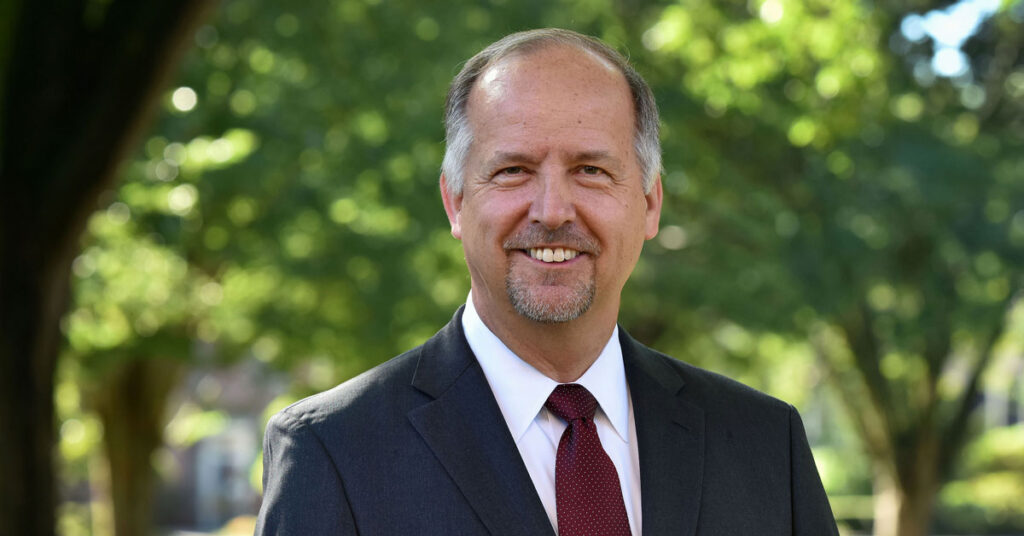Hanno wins Burke Presidential Award

Leading the way on enriching the liberal arts with experiential education
Students benefit greatly from internships, research experiences and volunteer work—when they are able to access them. During the past seven years, President Dennis M. Hanno has ensured that experiential learning opportunities are within reach for every student at Wheaton.
As a result, experiential learning—long part of Wheaton’s offerings—is formally integrated into the curriculum, and the college provides students with numerous ways to put their passion into practice. The extensive portfolio of opportunities for learning by doing distinguishes Wheaton among liberal arts colleges.
In recognition, The Washington Center for Internships and Academic Seminars and The National Society for Experiential Education have named President Hanno as the 2021 recipient of the William M. Burke Presidential Award for Excellence in Experiential Education. The award recognizes leaders who have personally championed experiential education as essential to the undergraduate experience, established and expanded opportunities to learn through experience and promoted it beyond campus.
“We are thrilled to award Dennis Hanno for his vision and leadership, which have proven critical in Wheaton College’s transformation to an experiential learning powerhouse,” said Chris Norton, president of The Washington Center. “President Hanno is an exemplary campus leader who is unwilling to accept limitations, who seeks innovative ways to better serve students as they begin examining career paths. Congratulations to President Hanno, the college’s dedicated faculty and staff, and all of Wheaton College’s student body and alumni.”
Under President Hanno’s leadership, the first step in ensuring that experiential education is part of every student’s experience came with the establishment of the Wheaton Edge, which guarantees access to funding to participate in a professional or research-based internship. President Hanno introduced the program in 2015.
Experiential learning was further integrated into the Wheaton experience with the fall 2020 launch of the Compass curriculum. Developed by the faculty and staff in a true community-wide effort, the curriculum helps students prepare for their post-academic futures by giving them the freedom and flexibility to create their own path to success through personalized advising and professional mentorship.
President Hanno also led the introduction of social innovation and social entrepreneurship programs at Wheaton. With a $10 million gift from the Diana Davis Spencer Family Foundation, the college established a professorship in social entrepreneurship, among the first liberal arts colleges in the nation to do so. The college’s business and management program offers a concentration in social entrepreneurship, non-profit management and philanthropy.
The social entrepreneurship major program is complemented by a portfolio of co-curricular offerings and campus resources, particularly the Innovation Spaces, a network of interdisciplinary makerspace labs that have been expanded during President Hanno’s tenure. (Wheaton was recently named to Newsweek’s list of the nation’s Best Maker Schools 2021.) In fact, the Idea Lab serves as a center for co-curricular innovation and entrepreneurship activities.
“Wheaton has a long history of combining the liberal arts with experiential education, which has always resonated with me as an extremely high-impact approach to teaching and learning,” Hanno said. “My goal has been to build on this historic strength, and I see this award as confirmation that our work as a community is amplifying that strength in ways that make a difference for students preparing to pursue their professional and personal interests.”
President Hanno’s focus on strengthening and expanding experiential education at Wheaton continues his career-long emphasis on social innovation, entrepreneurship and leadership. He is the founder and head of IDEA4Africa, and he has two decades of experience educating, mentoring and helping young entrepreneurs develop their skills to solve problems and improve the regional economy. Since 2000, hundreds of college and university students, alumni, staff and professors have traveled with him to sub-Saharan Africa to teach entrepreneurship to high school students, community members and small business owners.
